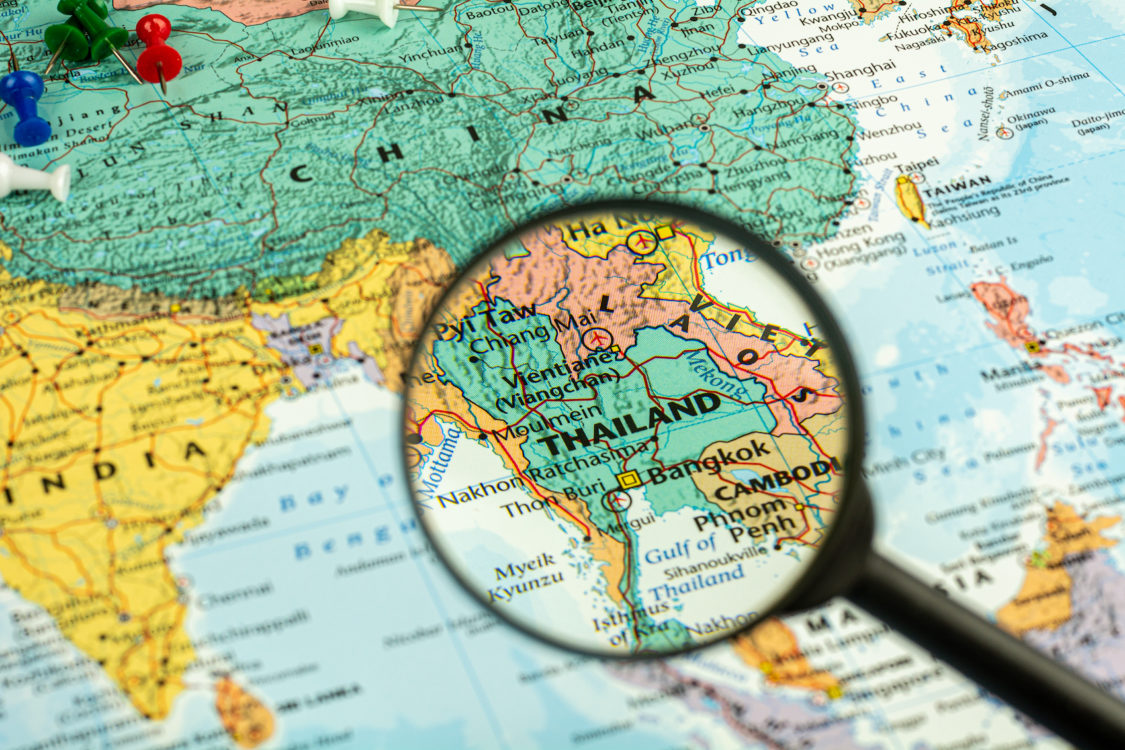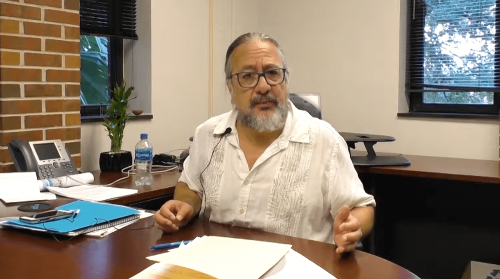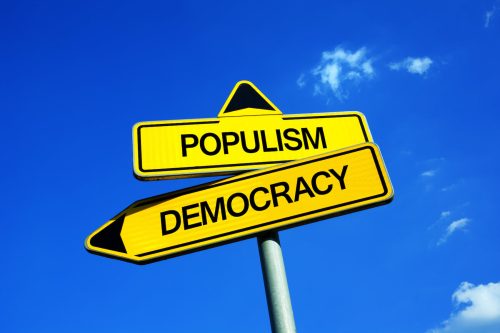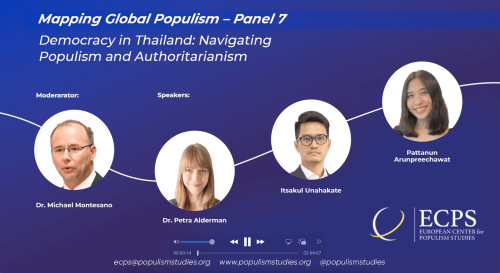Thailand

Populism has been a part of Thailand’s national politics since 2001. Successive pre-2001 governments failed to address core issues, leading to the election of populist Thaksin Shinawatra. Over the last two decades, the country has witnessed both the military disrupting democratically-elected governments’ tenures and democratically-elected populists turn to autocracy. In 2020, the youth-driven pro-democracy movement has demanded a new democratic order, one free of the power struggles between the oligarchs, junta, and bureaucracy that has made Thailand a fertile host for populism.
Thailand is a Southeast Asian constitutional monarchy with a parliamentary democracy. The earliest historical records show that humans migrated to the area around the eleventh century. The current monarchy, the Chakri dynasty, was established in the 17th century. Thailand is the only country from Southeast Asia that did not experience any direct colonization. However, during the era of European colonization, Thailand still suffered under unfavorable treaties with multiple European powers. These treaties resulted in Thailand supporting the Allied forces in World War I. Following the War, the “western-educated” members of the military and the bureaucracy launched the Siamese revolution of 1932, which laid the foundation for the country to become a democracy. During the Second World War, Thailand acted as a “satellite” state for the Japanese and was heavily bombed by the Allied forces. However, the country was not seriously reproached by the British after the Japanese defeat, leaving its monarchy intact.
Though the protests and coup of 1932 set Thailand on the path to democracy, the country still faced political turbulence. Its political history is tarnished by a series of internal power rifts between the monarchy, military, aristocracy, and bureaucracy which have led to several constitutions being formed, scrapped, and reformed, as multiple military coup d’état have disrupted elected governments. Citizens face draconian punishments for speaking against the Royal Family, and elected governments have not been shy in using authoritarian and coercive measures to curb public opinions.
During the Vietnam War, Thailand experience a period of growth and development. In 2003, following a period known as “the Lost Decade,” Thailand was finally able to pay off its debt to the International Monitory Fund (IMF). Economically, its landscape has allowed the country to produce a variety of crops such as sugar, corn, jute, cotton, and tobacco. Thus, agriculture plays a dominant role in the economy. The industrial sector is the smallest contributor, while the service sector remains a major contributor (Nordea, 2020).
Despite economic GDP growth, the trickle-down effect is yet to be felt by the average Thai. Currently, 91.7 percent of adults make less than US$10,000 a year. The country features high-income inequality, sporting value of 90.2 on the Gini Index (a score of 0 equals perfect equality, while a score of 100 equals perfect inequality; the world average in 2013 was 65). Rural and urban divides in poverty trends are also an issue, while within cities income inequity is very evident. Bangkok’s slums are a testament to urban poverty littered between its towering skyscrapers (ASEAN Post, 2020).
The first wave of populism in modern Thai politics arose at the beginning of the 21st century when business tycoon and politician Thaksin Shinawatra entered the political arena (Choi, 2005). His party, the Thai Rak Thai (TRT) or “Thais Love Thais,” was founded in 1998 in the aftermath of the formation of the 1997 Constitution, which granted political parties room to develop.
Thaksin, an oligarch, had previously had mild success as a politician. He used populism and reformist campaign promises to win popular support. His media campaigns targeted the largely forgotten rural regions and promised agri-subsidies, healthcare, and more investment in scholarships. This narrative proved highly popular, as Thais were facing economic hardships due to the aftermath of the Asian Crises and subsequent IMF interventions. Despite being an “elite,” Thaksin, with careful media campaign messaging, was able to portray himself as the “people’s guy,” who was never accepted by the elites and now campaigned for the poor (Choi, 2005). If the 1997 Constitution gave the populace hope, it also helped Thaksin, who portrayed himself as a beacon of democracy compared to the previous military governments.
TRT won a landslide victory in the 2001 general election, ushering in an era of Thaksin-ism and Thaksin-nomics. Following through on its populist promises, TRT introduced its 30 Bhat (1USD) health care scheme. Additionally, huge efforts were made to alleviate rural poverty by instituting a three-year debt moratorium for farmers and allocating funds for villages (Hewison, 2017). The One Tambon, One Product (OTOP) program for agri-based Small and Medium Enterprises (SMEs) was aimed at supporting value-added agricultural activities.
The Thaksin-economic model was a hybrid. It used Keynesian economics, but at the same time pursued neo-liberal reforms such as the privatization of certain key state assets. By 2003, Thailand was able to pay off its IMF debts; until 2006, GDP growth remained high (Hewison, 2017). Thaksin was also able to deliver on his promise of improved access to education. He legalized gambling and the funds supported the “One District, One Scholarship” program, as well as other public programs.
While Thaksin produced results, his mannerism was not that of a democratically-elected leader. Rather, he used his “CEO” style to get the job done. His style – and its effectiveness – was popular amongst voters. It was, however, detrimental to the budding Thai democracy. He quashed opposition media, “bought off” Senators, and rarely made parliamentary appearances. He assumed an increasing aura of authoritarianism, a common feature of populist leaders. When questioned, Thaksin justified his behavior by saying that he was “giving results” (Phongpaichit & Baker, 2007).
During his term, Thaksin introduced “CEO-Governors” in a bid to be more finically effective in the administration of the provinces. Since Thaksin was able to deliver on a number of his promises, he ran for his second term under the mottos, “Four Years of Repair – Four years of Reconstruction” and “Building Opportunities.” He again won a landslide victory (Bunyamanee, 2018; Askew, 2005). His ability to secure rural voters through his populist policies earned him a bedrock of populist voters.
Newly victorious, he imposed the Emergency Decree of 2005 to “manage” three troubled provinces that had seen an insurgency by separatist Muslims. This decree allowed him to curb civil liberties, leading to mass casualties. In this and his “war on drugs,” more than two thousand people were killed (Choohavan, 2013). A wave of “Yellow Shirts” – pro-monarchy protests – erupted due to corruption scandals and Thaksin’s increasing abuses of power. This eventually resulted in Thaksin going into self-imposed exile and his party being banned.
It has been over a decade since Thaksin ran as a populist, but since 2001 every election has seen populist parties winning a meaningful percentage of votes. The Pheu Thai Party (PTP) or For Thais Party, was formed in 2008, as an offshoot of the TRT. Yingluck, Thaksin’s sister, ran and won under the party’s banner. She also used populist policies and agendas to secure rural votes. She proposed highly impractical rice subsidies for farmers in addition to other Thaksin-nomic-style rural programs. Redistribution of wealth was a core agenda of her politics: she promised tax reforms and raising the minimum wage (BBC, 2017). Yingluck met a similar fate to her brother and was forced into self-exile following the 2014 military coup. In 2019, PTP candidate Sudarat Keyuraphan ran a similarly populist campaign. He promised to “fatten the people’s wallets” and PTP was able to secure the most seats – but not a majority – in Parliament. However, unable to form a coalition government, she leads the main opposition (Thai PBS World, 2019).
It was not only pro-Thaksin parties that used populism to sway voters in the 2019 campaigns. The Palang Pracharath Party (PPP), a pro-junta and conservative party, was able to form a government, and their candidate Prayut Chan-ocha became Prime Minister. He has vowed to give cash payments to support farmers, invest in public works, and pass other pro-poor reforms. In 2017 and 2018, the junta-led government invested in initiatives such as welfare-card schemes to set the tone for the PPP’s election campaign (Janseen, 2019; Pesek, 2019).
The elections also saw the emergence of Thanathorn Juangroongruangkit, billionaire-turned-politician, and his Future Forward Party (FFP). It won the third most votes in 2018. However, in 2020, the FFP was dissolved due to violations of campaign regulations. While PPP and PTP have focused on pro-poor populist agendas, FFP’s anti-junta and progressivism appealed to its voters. While Thanathorn is a part of the elite himself, he was able to connect with younger and more urban voters through a mix of center-left “big promises” – such as spending Bt650 billion on welfare expansions and his mission to “liberalize” the economy, (Thai PBS World, 2019; Pesek, 2019).
Other major parties such as the Abhisit Vejjajiva’s Democrat Party (DP) and the Bhumjaithai Party (BP) led by Anutin Charnvirakul have also made populist campaign promises, including the DP’s pledge to implement land reforms and Charnvirakul’s radical idea of growing marijuana to achieve economic prosperity for every Thai (Thai PBS World, 2019).
Thaksin’s populist promises and their transition into policies created a rural base for populist voters in Thailand. At the same time, they fashioned extreme polarization between the voters of the urban center and rural economies (Healy & Xia, 2019). The rural factions seek more government spending, and they recall the PTP and TRT’s favorable policies towards them; urban voters see this obsession with handouts as a hidden guise for populist leaders to ease their way into power and to implement an authoritarian-style democratic rule (Healy & Xia, 2019).
The public protests triggered by a series of totalitarian abductions of pro-democracy youth leaders and growing economic hardships brought on by COVID-19 are a fixture of 2020 in Thailand. They are an organic, peaceful movement led by leaderless youths using social media and educational campuses to connect. They seek the dissolution of the recently-elected government and to establish a “real” democracy for their country (Phoophongphiphat, 2020; Wright & Praithongyaem, 2020). It is not yet clear what the outcomes of this new wave of civil unrest could be, but the growing routine of abuse of power and widening inequality under populist governments has ignited widespread unrest, which is further destabilizing this fragile democracy.
October 13, 2020.
References
— (2017). “Profile: Yingluck Shinawatra.” BBC. August 23, 2017. https://www.bbc.com/news/world-asia-pacific-13723451 (accessed on October 5, 2020).
— (2019). “Fighting populism with more populism?”. Thai PBS World. March 12, 2019. https://www.thaipbsworld.com/fighting-populism-with-more-populism/ (accessed on October 5, 2020).
— (2020). “Growing gap between richest and poorest Thais.” The ASEAN Post. May 1, 2020. https://theaseanpost.com/article/growing-gap-between-richest-and-poorest-thais#:~:text=In%20Thailand%2C%20the%20distribution%20of,end%20of%20the%20wealth%20spectrum.&text=Only%200.1%20percent%20are%20members,90.2%20on%20the%20Gini%20index(accessed on October 5, 2020).
— (2020). “Maaprofiili Thailand.” Nordea. https://www.nordeatrade.com/fi/explore-new-market/thailand/economical-context#:~:text=Its%20economy%20is%20heavily%20based,tobacco%20among%20its%20major%20crops (accessed on October 5, 2020).
Askew, Marc. (2005). “Thaksin’s Election Triumph: Re-packaging Old Politics?” ASEAN Focus Group. http://www.aseanfocus.com/asiananalysis/article.cfm?articleID=838(accessed on October 5, 2020).
Bunyamanee, S. (2018). “Populism casts shadow over Thai politics.” Bangkok Times. December 18, 2018. https://www.bangkokpost.com/opinion/opinion/1596822/populism-casts-shadow-over-thai-politics (accessed on October 5, 2020).
Choi, J. (2005). “Economic Crisis, Poverty, and the Emergence of Populism in Thailand.” Journal of International and Area Studies,12(1), 49-59. http://www.jstor.org/stable/43107110 (accessed on October 5, 2020).
Choonhavan, K. (2013). “Thaksin’s ‘war on drugs’ a crime against humanity.” Bangkok Post. December 12, 2013. https://www.bangkokpost.com/opinion/opinion/384560/thaksin-war-on-drugs-a-crime-against-humanity (accessed on October 5, 2020).
Healy, Chris and Xia, Andersen. (2019). “Nearly 13 years after being ousted, Thaksin still a divisive force in Thai politics.” South China Morning Post. March 14, 2019. https://www.scmp.com/video/scmp-originals/3001705/nearly-13-years-after-being-ousted-thaksin-still-divisive-force-thai (accessed on October 5, 2020).
Hewison, K. (2017). “Reluctant populists: Learning populism in Thailand.” International Political Science Review. 38(4), 426–440. https://doi.org/10.1177/0192512117692801 (accessed on October 5, 2020).
Janssen, Peter. (2019). “Populism back in vogue in electoral Thailand.” Asia Times. March 21, 2019. https://asiatimes.com/2019/03/populism-back-in-vogue-in-electoral-thailand/ (accessed on October 5, 2020).
Pesek, William. (2019). “Thailand just can’t quit populism.” Nikkei Asia Review. January 17, 2019. https://asia.nikkei.com/Opinion/Thailand-just-can-t-quit-populism (accessed on October 5, 2020).
Phongpaichit, Pasuk, Baker, Chris (2007) “Thailand’s ‘Good Coup’: The Fall of Thaksin, the Military and Democracy.” Journal of Contemporary Asia. 38, 62-83. https://doi.org/10.1080/00472330701651960 (accessed on October 5, 2020).
Phoonphongphiphat, A. (2020). “Thailand to block 2,000 websites ahead of pro-democracy protests.” Nikkei Asia. September 18, 2020. https://asia.nikkei.com/Politics/Turbulent-Thailand/Thailand-to-block-2-000-websites-ahead-of-pro-democracy-protests (accessed on October 5, 2020).
Wright, George and Praithongyaem, Issariya. (2020). “Wanchalearm Satsaksit: The Thai satirist abducted in broad daylight.” BBC. July 2, 2020. https://www.bbc.com/news/world-asia-53212932 (accessed on October 5, 2020).








